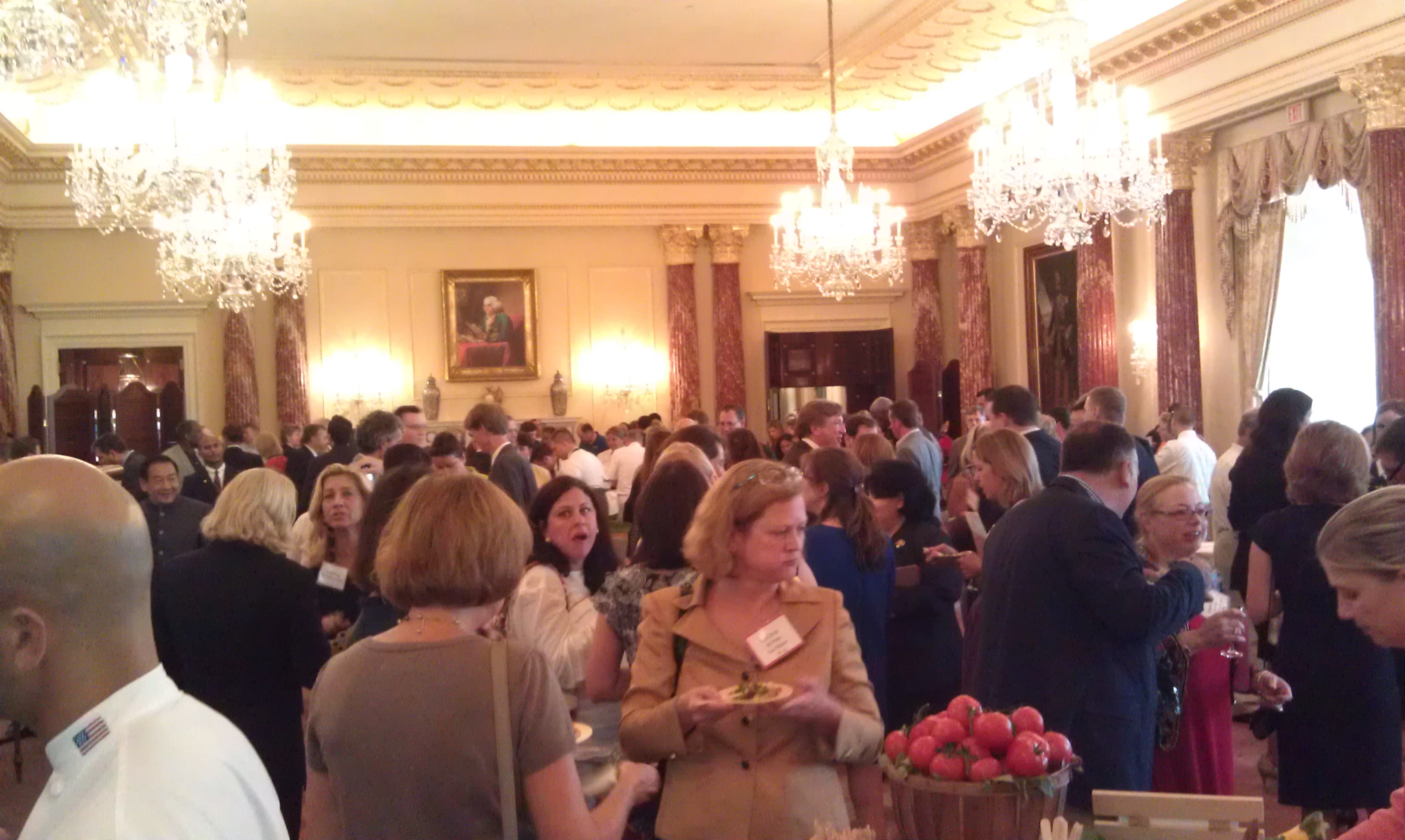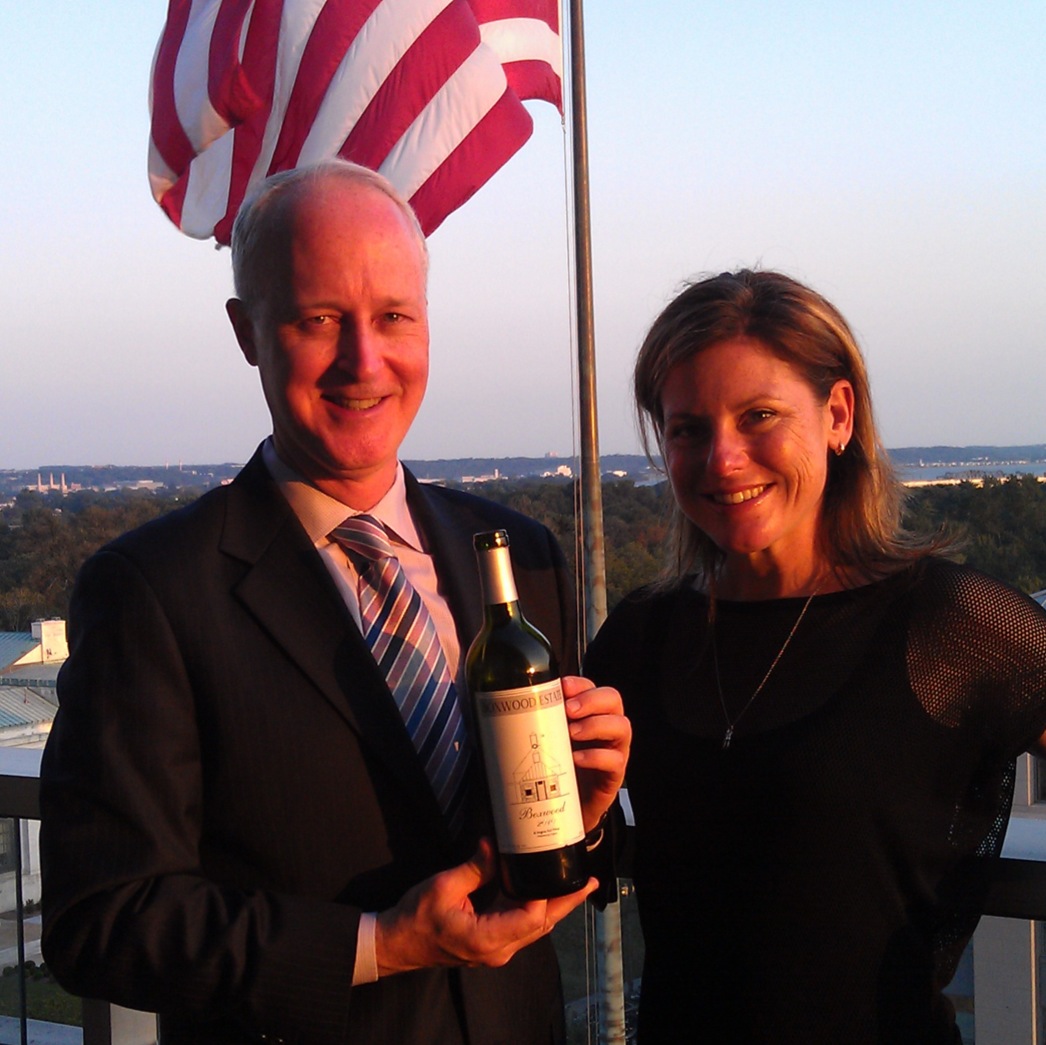 Last Friday, the State Department launched a “Diplomatic Culinary Partnership” initiative with a fantastic reception in their gilded diplomatic reception rooms.
Last Friday, the State Department launched a “Diplomatic Culinary Partnership” initiative with a fantastic reception in their gilded diplomatic reception rooms.
A lively, young guest list included many top U.S. chefs, winemakers, mixologists, and artisanal food producers (including White House Executive Chef Cris Comerford, the first woman to hold that job, appointed in 2005 by then First Lady Laura Bush). They sampled a variety of seafood, meats, cheeses, deserts, and cocktails that showcased America’s rich culinary traditions. They were also treated to a selection of wines presented by Andrew Stover’s Vino50 from Texas, Idaho, Michigan, New York, Arizona, Virginia and California, as U.S. Marine Corps musicians played jazz and pop tunes and Benjamin Franklin gazed down from the 1767 portrait by David Martin.
It was a remarkable recognition of how important food, drink, and meals can be as a medium of intercultural communication and respect.
Smart diplomats have known this for a long time. I always looked for ways to incorporate things like Smithfield Ham and Texan wines (well, not always together) at official meals I hosted overseas, and became practiced at staring down colleagues and budget people who thought that was eccentric at best.
But Secretary of State Hillary Clinton has more purposefully embraced the concept than any U.S. official I can think of. She regularly seeks out America’s top chefs, who work with the best regional American ingredients, to help prepare meals for visiting foreign leaders.
 No more rote resort to standardized pseudo-French catering menus! Rick Bayless (Frontera Grill) came in to prepare the food for the White House State Dinner for Mexico’s President. Ming Tsai (Blue Ginger) prepared the State Department lunch for China’s Vice President, and April Bloomfield (Spotted Pig) prepared the meal State offered to the British Prime Minister. Washington’s celebrity chef Jose Andres cooked for the 50th anniversary celebration of State’s diplomatic reception rooms.
No more rote resort to standardized pseudo-French catering menus! Rick Bayless (Frontera Grill) came in to prepare the food for the White House State Dinner for Mexico’s President. Ming Tsai (Blue Ginger) prepared the State Department lunch for China’s Vice President, and April Bloomfield (Spotted Pig) prepared the meal State offered to the British Prime Minister. Washington’s celebrity chef Jose Andres cooked for the 50th anniversary celebration of State’s diplomatic reception rooms.
Clinton’s efforts to showcase and harness the best of American gastronomy underscore how crucial meals can be in diplomacy – a chance for pause, good conversation and cultural connection, in the midst even of otherwise very difficult conversations or negotiations. Food is something all people have in common, regardless of any differences. Politics divides. Food connects, often on a very personal level. On display at the reception was a touching, five-page, handwritten note from Britain’s Queen Elizabeth to President Eisenhower, explaining how to make scones!
At the Friday event, a number of American chefs were designated “State Chefs.” They and other participants will form part of a new corps that will visit other countries as culinary ambassadors, working with our Embassies and Consulates to demonstrate and teach about America’s diverse culinary traditions.
What an evening – a really brilliant initiative from America’s Chief of Protocol, Capricia Marshall.
William McIlhenny is associate publisher of JamesSuckling.com. A former American diplomat and member of the Secretary of State’s Policy Planning Staff, William held a number of assignments in Europe and Latin America. He works in Washington, D.C.
